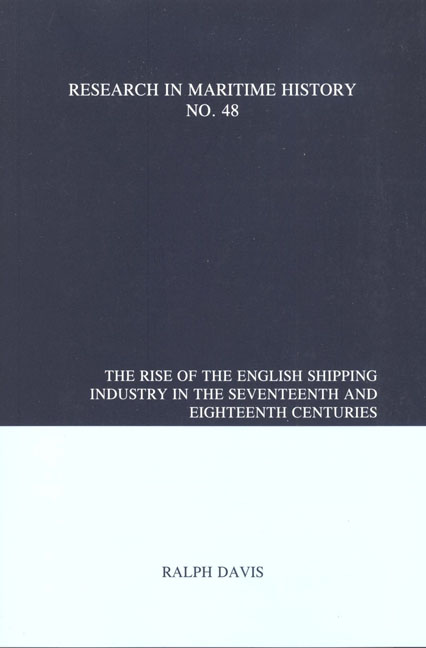Book contents
- Frontmatter
- Contents
- Introduction to the 2012 Edition
- Series Editor's Note
- Introduction
- Preface
- Chapter 1 The Widening of Horizons, 1560-1689
- Chapter 2 Consolidation, 1689-1775
- Chapter 3 Ships and Shipbuilders in the Seventeenth Century
- Chapter 4 Ships and Shipbuilders in the Eighteenth Century
- Chapter 5 The Shipowners
- Chapter 6 The Merchant Seamen
- Chapter 7 The Pay and Conditions of Merchant Seamen
- Chapter 8 Shipping Management and the Role of the Master
- Chapter 9 Shipping and Trade
- Chapter 10 The Nearby and Northern European Trades
- Chapter 11 The Southern European and Mediterranean Trades
- Chapter 12 The East Indian Trade
- Chapter 13 The American and West Indian Trades
- Chapter 14 The Government and the Shipping Industry
- Chapter 15 War and the Shipping Industry
- Chapter 16 Four Ships and Their Fortunes
- Chapter 17 Was It a Profitable Business?
- Chapter 18 Conclusion
- Appendix A A Note on the Shipping Statistics, 1686-1788
- Appendix B Sources for the History of the Shipping Industry
- Index
Chapter 17 - Was It a Profitable Business?
- Frontmatter
- Contents
- Introduction to the 2012 Edition
- Series Editor's Note
- Introduction
- Preface
- Chapter 1 The Widening of Horizons, 1560-1689
- Chapter 2 Consolidation, 1689-1775
- Chapter 3 Ships and Shipbuilders in the Seventeenth Century
- Chapter 4 Ships and Shipbuilders in the Eighteenth Century
- Chapter 5 The Shipowners
- Chapter 6 The Merchant Seamen
- Chapter 7 The Pay and Conditions of Merchant Seamen
- Chapter 8 Shipping Management and the Role of the Master
- Chapter 9 Shipping and Trade
- Chapter 10 The Nearby and Northern European Trades
- Chapter 11 The Southern European and Mediterranean Trades
- Chapter 12 The East Indian Trade
- Chapter 13 The American and West Indian Trades
- Chapter 14 The Government and the Shipping Industry
- Chapter 15 War and the Shipping Industry
- Chapter 16 Four Ships and Their Fortunes
- Chapter 17 Was It a Profitable Business?
- Chapter 18 Conclusion
- Appendix A A Note on the Shipping Statistics, 1686-1788
- Appendix B Sources for the History of the Shipping Industry
- Index
Summary
The four examples in the previous chapter present a pattern; seventeenthcentury unprofitability, eighteenth-century gains, in shipowning. It happens that the two early examples are of ships which had not firmly established themselves in particular trades, the two later ones of ships which quickly attached themselves to a single route and a single commodity and produced good results because they always secured full or nearly full cargoes without difficulty. The experiences of four ships cannot, by themselves, prove anything. However, I hope to indicate by the use of other sources - though the evidence is not sufficiently precise to justify a firm conclusion - that the trend accidentally illustrated may be a real one.
It is first necessary to examine more carefully the whole make-up of the costs of operating ships, of which wages and the victualling of crews are only a part. The best evidence on costs - and indeed on earnings and profits - comes from account books kept by ships’ masters, of which considerable numbers survive. These are records of masters’ financial relations with their owners; they show all the payments made by a master on his owners’ account and his receipts on their behalf. The accounts may be misleading in minor respects - sometimes through deliberate falsification by the master - but most of them are substantially accurate as records of receipts and payments.
The circumstances of their survival, however, indicate the chief difficulty in using them. Nearly all have been preserved in the records of the courts - particularly the High Court of Admiralty - after their production as evidence in legal actions. The most common reason for the kind of dispute which required the production of the ship's account book was a quarrel over finance between the master and his owners. Either the owners were querying some items of receipts or payments, suggesting that the accounts were fraudulent in specified ways; or they were expressing incredulity at the bad results of a voyage and imputing recklessness or negligence to the master. In either case, the results of the operations shown by the account book are likely to be untypical of the kind of activities which made it worthwhile to keep ships operating. If one simply aggregated the results of all voyages for which complete ships’ accounts exist in the court records, the alleged total costs would certainly far exceed the alleged total earnings.
- Type
- Chapter
- Information
- The Rise of the English Shipping Industry in the Seventeenth and Eighteenth Centuries , pp. 349 - 372Publisher: Liverpool University PressPrint publication year: 2012



